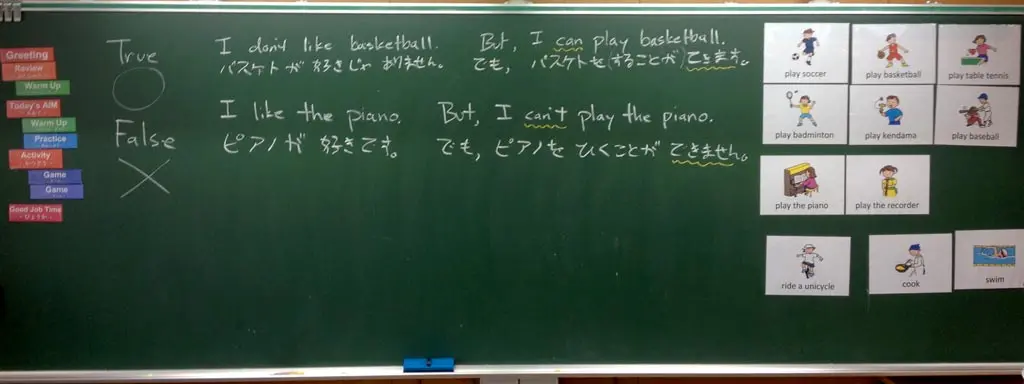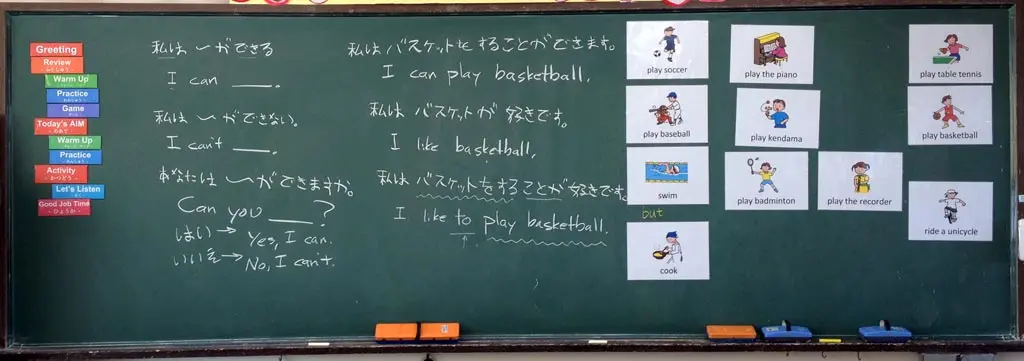This really the first lesson for 6年生 that deals with some completely new grammar. I made sure to review grammar they already should know, "I like __," and then had them compare it to the new grammar of "I can ___."
I was so busy at the end of the first semester, that I didn't have time to search for a new song. I wanted to save "Here comes the sun" for the third semester, since it's about Spring.
Unfortunately, both lessons 3 and 4 are the perfect time for a new song. I just didn't have anything. And when I asked the teachers if they had any songs they wanted me to teach their students, they couldn't think of anything. Next year, I plan on having something, though.
Again, the book can provide some great flashcards. Unfortunately, these images are not vector. I don't know why. :( I used the images on page 12. For each one, I added text underneath the image, to reinforce the grammar of the image, rather than just the activity. "Play soccer" versus just "Soccer."
First we reviewed months. After that I began the lesson by writing the following on the board, and I asked the students what they thought it meant.
I don't like basketball. But, I can play basketball.
Every class hesitated, so I just asked them for the first part, and reminded them it's 5年生 level. Some of the students began to piece it out, and started speaking, but some classes were completely tight lipped. For those classes, I broke it down further. "First, what is 'I' in Japanese?" Once the students got it, I wrote the Japanese underneath.
私はバスケットが好きじゃありません。
Then I asked for the second part. I gave them でも, as they didn't know what 'but' meant. I think in 2 of my 4 classes, an English adept student figured it out, or knew it, and responded with できる. I wrote out the full Japanese phrase.
でも、私はバスケットをすることができます。
The する is important with trying to teach the students 'play', so I didn't shortcut the phrase to exclude it.
Next, I wrote:
I like the piano. But, I can't play the piano.
The first part is easily translated by the students. And some students figured out the second part without too much coaching.
私はピアノが好きです。でも、私はピアノをひくことができません。
I underlined both 'I can' and 'I can't', and underlined the corresponding できます and できません in the sentences to reenforce the meaning. For some classes, I used different colors to identify the different parts of the sentences when comparing the two languages.
And then we went through all of the vocabulary. First, I asked the students, "What does バスケットをする mean in English?" I pointed to the board, and they responded correctly with, "Play Basketball." I put that flashcard on the board, and we went through the rest of the vocabulary.
ピアノをひく got many "Play Piano" responses, and I needed to correct them to say, "Play the Piano." After that, 料理をする got many, "Play Cooking" responses. I said, "No," and corrected them with "Cook". およぐ is similar, but they knew that "Play Swimming" is wrong. Some figured it out after thinking about it. :) No one correctly figured out 一輪車を乗る, though.
Anyway, we practiced, then did the Keyword Game to further practice the phrases. Then we played the True / False Game, where I said, "I can ___," or "I can't ___" with the vocabulary and the students guess whether it's True or False.
Overall, I think writing the Japanese on the board is incredibly effective for teaching the students this stuff. Before class, one student complained that I don't use enough Japanese in class. After, I asked her if she understood, and she said, OK. :)
We quickly reviewed the grammar from last time. I wrote 私は____ができる and 私は___ができない, on the board and asked them to translate. We went through the vocabulary, too, and then we played the Keyword Game as practice, and for the students to hear the difference between "can" and "can't", which some students found difficult.
Next, I wrote あなたはバスケットをすることができますか on the board, and ask the students if they knew the meaning in English. They knew "play basketball" and "can". I helped them with あなた, which is "you". And then tried to get them to arrange the phrase in the correct order. It didn't take too long to get, "Can you play basketball?"
Then, I asked for the はい, or "Yes", response. I pointed back to できる for the students having trouble. Everyone quickly figured out the いいえ, or "No", response. Then we practiced a few times.
We did the Census Game for the activity. Students put their heads down, and I asked the class "Can you ____?" with the vocabulary. If students can, they raise their hands. If not, they don't. For each response, I counted the students and wrote the number underneath the flashcard on the board.
Then students guessed which action is number 1 in the class, or number 2, or number 3. Then they guessed how many students can do each activity. "Play Soccer", "Swim", and "Play the Recorder" are the most top answers.
At the start of class, I wrote できる and できない once again, and the students translated. Then できますか. We ran through the Keyword Game for a 3rd boring time because it's now at the beginning of the second semester for most of my classes. So, they actually needed the review.
For this class, I introduced the grammar "like to." The book doesn't really focus on this, but I wanted to give the students a bridge from using past grammar with the current vocabulary.
After review, I wrote the following on the board, and asked the students to translate:
私はバスケットをすることができます。
The can do it easily: I can play basketball. Then I wrote the next sentence.
私はバスケットが好きです。
Students knew this one, too, and could easily translate, I like basketball. Then, I wrote the next sentence to see what the students knew.
私はバスケットをすることが好きです。
Some students guess's contained "can", but I pointed out that できる doesn't appear in the sentence. Students guessed, "I like play basketball", which is very very close. I wrote that down on the board with a space between 'like' and 'play', and asked the students what こと translates as. I also pointed out that for 'can' こと isn't used in English. 2 of my classes correctly guessed, but I think the teacher gave away the answer in one of my classes. こと is 'to'. So the translation is:
I like to play basketball.
All of this is written on the board as follows:
We practiced a little, then did the listening activity on page 11.
The first two are extremely straight forward and easy. They only use "I can __" and "I can't __." The third one gets complicated with both me and the HRT doing the script, and using all the grammar written on the board in an intelligible conversation. I don't think any students easily understood it. So, we tried again, but even slower. And some students started to get it.
Up until now, the students haven't really used any of the grammar I've taught them. It's mostly been instruction, and repeating. I began class by writing down あなたは___ができますか and asked them to translate. (Can you ___?) And then asked for the はい and いいえ responses. We practiced with the vocabulary.
Then the students started working on the activity of page 10 in the book. Students thought about the things their partners can do, then they asked them about it.
After that, I wrote あなたは____ことが好きですか on the board, and asked for the translation. Eventually a few students remembered, "Do you like", but I needed to remind them about こと and "to". Then I asked for the はい and いいえ responses.
This is all in service for the Interview Game I prepared on a worksheet. I passed out the worksheets to students, and we practiced each of the questions on the sheet. "Can you play badminton?" "Can you play kendama?" "Can you ride a unicycle?" "Do you like to play the recorder?" "Do you like to cook?"
Then there's one last question: What sport can you play?. I wrote it on the board, and asked the students for the Japanese meaning. And I helped them along asking them for each part. "What does you mean?" "How about what sport? What does this mean?" And we built the correct phrase.
あなたは何のスポーツをすることができますか。
I asked for the answer, and most students realized, they should say, "I can play ___."
The interview is a little daunting, but all the grammar and it's usage is written on the board. In fact, I noticed that several students were jotting down notes on my worksheets, too.
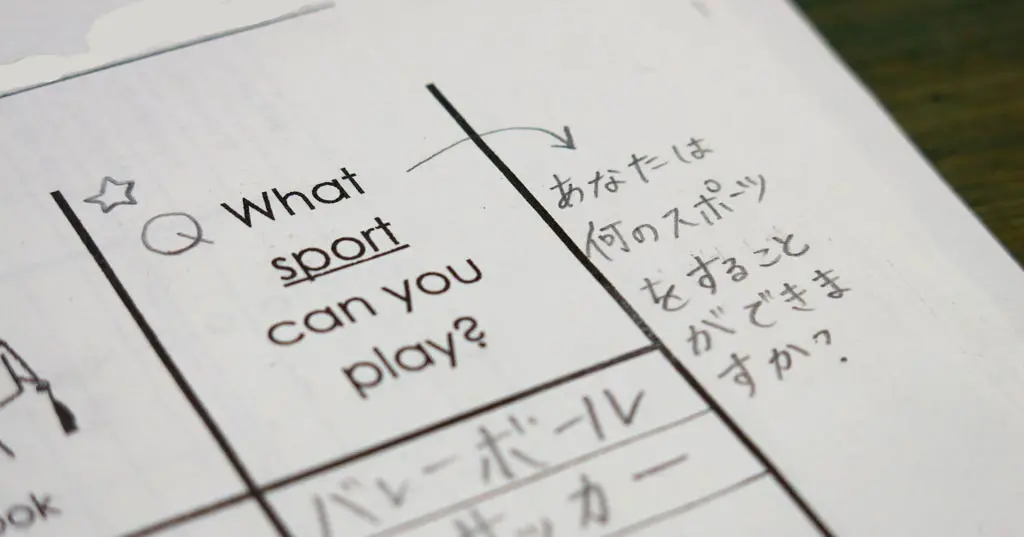
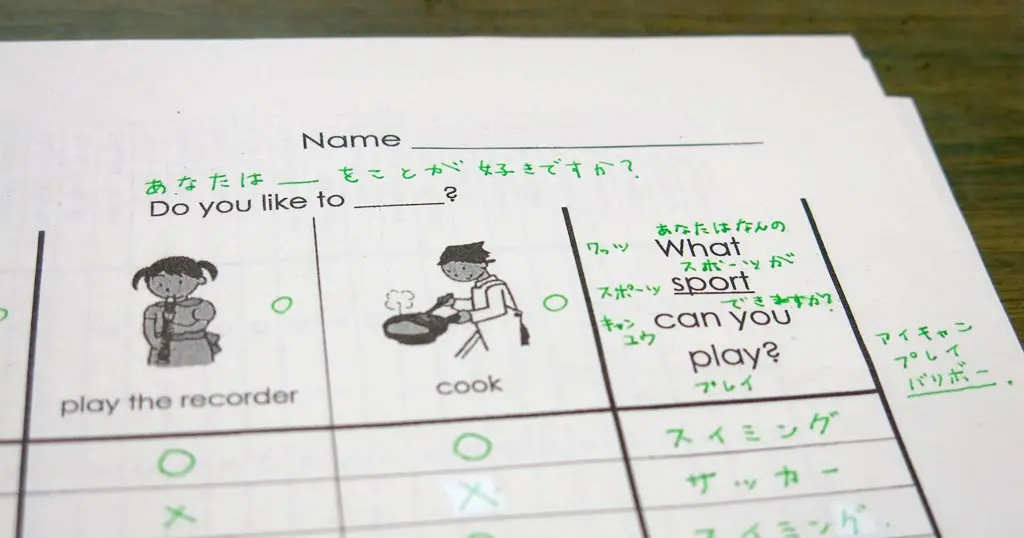
That's something that's clearly missing from all my instruction in elementary school. There's no clearly defined source of information for the students to look up the meanings. They have no dictionaries, and the textbook doesn't outline anything at all. The textbook is really just an activity book with a bunch of pictures and bullshit. There's no way you could actually learn English by using it alone.
In future lessons, I'm definitely going to provide something for the students that they can reference and study. I mean, how else are they supposed to study this stuff? Just by remembering? Thinking about myself, there's no possible way I could do that. My classes definitely need this going forward.
For the final class for できる, I used the results from the interview, and played the "Who am I?" guessing game.
For 6年生, I have 4 classes. 2 are very big, so it's impossible for a student to get everyone's response. And the other 2 don't really like English, so they don't get many responses, either. For all classes, I compiled the list of all students responses, and printed it on the back on their worksheets.
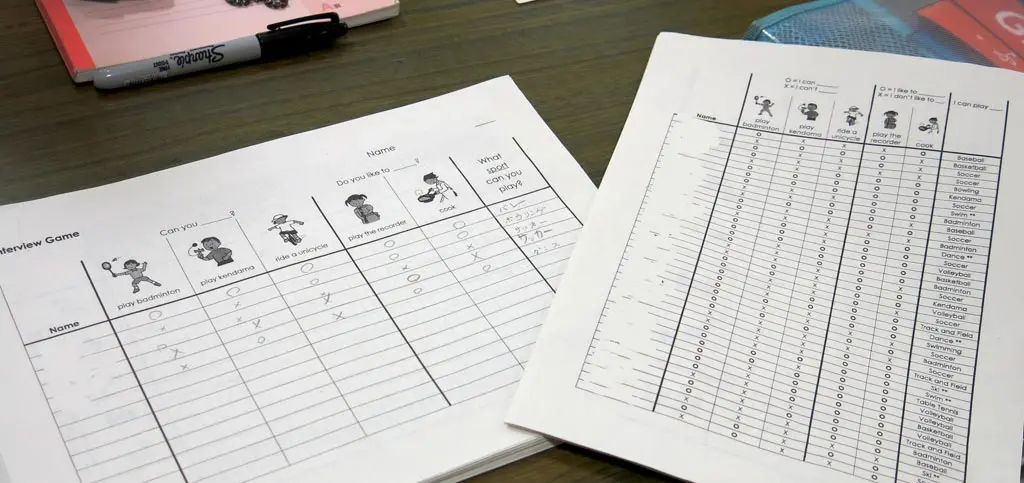
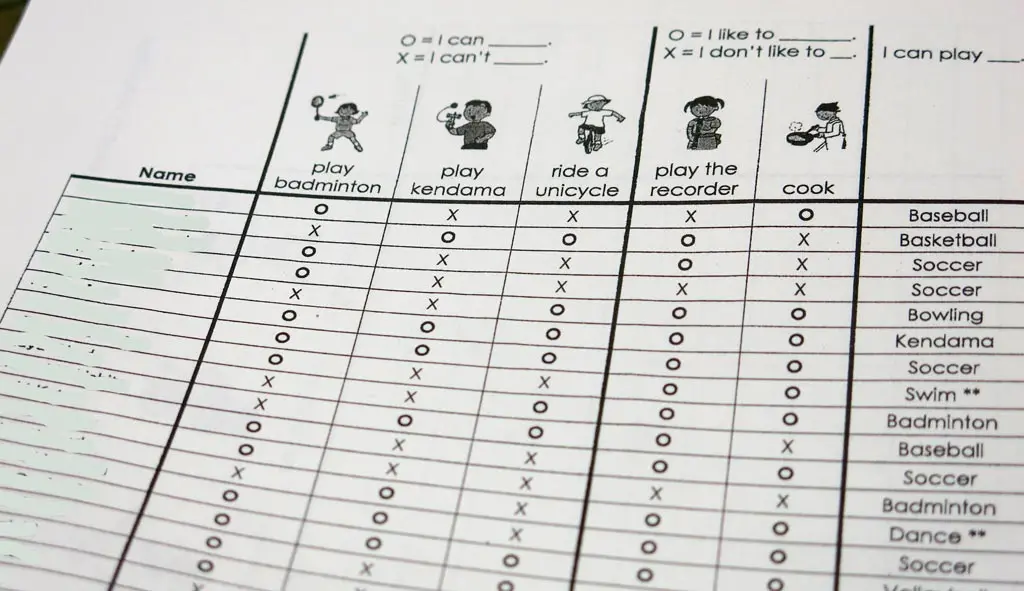
That way everyone is on equal ground. PLUS, any student who was absent now has the opportunity to continue, too. Also, this is possible, because I made everyone interview their partner first, so I have a response from every student.
But first, for review, I wrote down できますか and 好きですか on the board, and had the students translate and provide the はい and いいえ responses. Then we played the Question Game, and I asked students either "Can you __?" and "Do you like to __?" If the student provides the correct answer, they can sit down with their row or column of classmates.
After, I erased all that stuff, and I wrote down できる, できない, 好きです, and 好きじゃない, and the students translated. Then I passed out the worksheet, and I introduced the "Who am I?" Guessing Game.
For this game, I randomly choose a student on the list and say the things I can and can't do, and the things I like and don't like to do. The students match what I say to the spread sheet, and try to figure out who am I. Then they play it groups. Then I get some volunteers to come to the front of class.
With my classes of 40 students, it's certainly daunting, and there are some repeated rows, but everyone understood the game, and they all did pretty well.
Thinking back on it now, I guess I waited a while until I made the students actually use the grammar I taught them. They practiced and repeated the grammar over and over, but never really used it for themselves until the 4th lesson. I need to use that Prediction activity on page 10 sooner, but the Census Game is really fun. I dunno. I should probably use it for the review in the 3rd lesson instead of another Keyword Game. But classes were broken up by the summer vacation. Bleh..
Anyway, students have a lot of grammar at their disposal now: "How many __?" "How many do you have __?" "When is your birthday?" "Do you like ___?" "Can you ___?" "Do you like to ___?" Plus, they know how to spell their names. I think I might postpone the next lesson, and focus on all the grammar they should know. And maybe have them make an extended self introduction. Maybe they could draw another poster, too.
